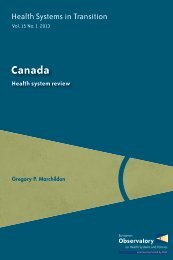Health Systems in Transition - Hungary - World Health Organization ...
Health Systems in Transition - Hungary - World Health Organization ...
Health Systems in Transition - Hungary - World Health Organization ...
You also want an ePaper? Increase the reach of your titles
YUMPU automatically turns print PDFs into web optimized ePapers that Google loves.
72<br />
<strong>Health</strong> systems <strong>in</strong> transition <strong>Hungary</strong><br />
NHIFA or (b) obta<strong>in</strong>ed this treatment <strong>in</strong> accordance with bilateral <strong>in</strong>ternational<br />
treaties or the European Commission Regulation 883/2004, which deals with<br />
the provision of health care <strong>in</strong> EU Member States.<br />
Before 2004, there was no systematic, formal or transparent process for<br />
decid<strong>in</strong>g which services would be <strong>in</strong>cluded <strong>in</strong> or excluded from the benefits<br />
package. With EU accession <strong>in</strong> May 2004, <strong>Hungary</strong> was obligated to adopt<br />
Council Directive 89/105/EEC. This regulation aimed to ensure that transparent<br />
measures are adopted by national authorities <strong>in</strong> the pric<strong>in</strong>g and reimbursement<br />
of pharmaceuticals. Adopt<strong>in</strong>g this regulation, the government established the<br />
process of HTA to evaluate applications by pharmaceutical companies (2006/8).<br />
The NHIFA uses various criteria <strong>in</strong> the decision-mak<strong>in</strong>g process, such as health<br />
needs, cost-effectiveness and budget impact (2004/4) <strong>in</strong> order to classify certa<strong>in</strong><br />
pharmaceuticals for different categories of reimbursement (see sections 2.7.2<br />
and 2.8.4).<br />
The first steps towards a less generous benefits package were taken dur<strong>in</strong>g<br />
the economic crisis of 1995, when the HIF deficit led to calls for urgent action<br />
(see section 3.3.3). Act XLVIII of 1995 on the Amendments of Various Acts<br />
for the Purpose of Economic Stabilization subsequently curtailed both <strong>in</strong>-k<strong>in</strong>d<br />
and cash benefits. The ma<strong>in</strong> item excluded from the benefits package was<br />
tooth-preserv<strong>in</strong>g dental services for adults. Subsidies for balneotherapy were<br />
also removed, a co-payment for patient transfer (i.e. ambulance) services<br />
was <strong>in</strong>troduced, and sickness benefits were reduced (1995/5). In addition,<br />
employers became responsible for f<strong>in</strong>anc<strong>in</strong>g occupational health services<br />
(1995/8). The adverse effects of these measures – for example, a sharp drop<br />
<strong>in</strong> the use of dental services – forced the government <strong>in</strong> power from 1994<br />
to 1998 to reconsider the exclusion policy and re<strong>in</strong>troduce dental services<br />
with some co-payments (1996/1) for adults. The next government abolished<br />
co-payments for tooth-preserv<strong>in</strong>g dental treatments <strong>in</strong> 2001, thus restor<strong>in</strong>g the<br />
orig<strong>in</strong>al situation (2001/10). Nevertheless, the share of OOP spend<strong>in</strong>g on dental<br />
services has rema<strong>in</strong>ed very high, with total OOP expenditure <strong>in</strong> this category<br />
amount<strong>in</strong>g to HUF 106 billion (€418.7 million) <strong>in</strong> 2007 and thus exceed<strong>in</strong>g total<br />
NHIFA expenditure on dental services by a factor of five (OECD, 2010). OOP<br />
expenditure <strong>in</strong> this category represents 19.3% of the total private expenditure<br />
on health <strong>in</strong> <strong>Hungary</strong>.<br />
Act LXXXIII of 1997 on the Services of Compulsory <strong>Health</strong> Insurance<br />
and related decrees def<strong>in</strong>e which health services are free of charge, which<br />
are covered but require some user charges, and which are excluded from HIF<br />
coverage. The Act def<strong>in</strong>es a negative list based on the premise that, <strong>in</strong> pr<strong>in</strong>ciple,
















